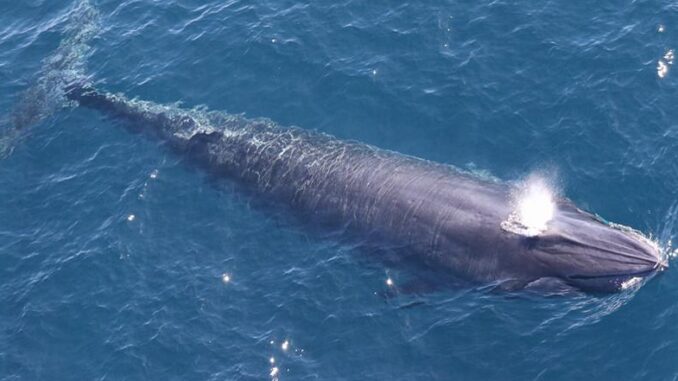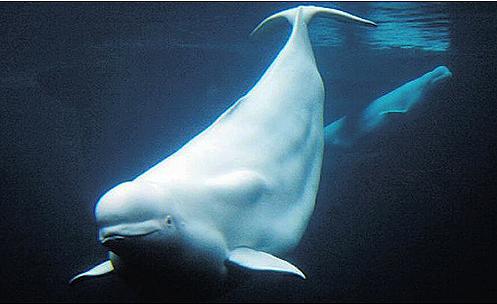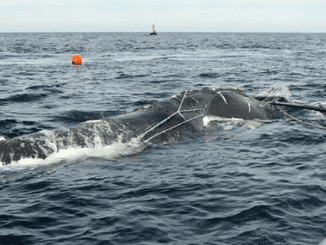
WASHINGTON, DC, October 11, 2025 (ENS) – On July 8, Congressman Nick Begich III, an Alaska Republican, introduced a draft bill amending the Marine Mammal Protection Act, MMPA, the federal law that has governed marine resource management and conservation of whales, orcas, porpoises, seals, polar bears, walruses, sea otters, and manatees in U.S. waters since 1972.
Congressman Begich’s bill would strip protections for these keystone species and remove bedrock scientific concepts to support the expansion of harmful extractive activities, like oil and gas extraction, in U.S. waters, environmental groups warn.
As analyzed by the nonprofit group Orca Conservancy based in Seattle, Congressman Begich’s amendment would “dismantle the current legal standards” for authorizing the hunt, capture, harassment, and killing of marine mammals and allow for automatic approval for take permits. Agencies would be stripped of their authority to require mitigation processes around marine mammal takes and to issue protective regulations.
The Begich III amendment would constrain the federal definition of “harassment” so that it no longer prohibits actions with the potential to harm marine mammals. It would remove protections for poorly-known marine mammal populations, and eliminate best-practice precautionary approaches backed by decades of science, the Conservancy advises.
The amendment would downgrade conservation goals by only ensuring survival and not maintaining a healthy population not require agencies to ensure “negligible impact,” as they must now, according to the Orca Conservancy.
The Conservancy warns that the change would remove safeguards for commercial fishing and downgrade the “zero bycatch goal” to a “near-zero bycatch goal.”
It would require unreasonable or impossible data to estimate population abundances and design best practices for management.
“These changes would decimate federal protection for threatened and endangered populations of marine mammals, including orcas, by walking back decades of stewardship and conservation in favor of destructive exploitation,” the Orca Conservancy said in a statement.
Who is Nick Begich III?

Founder of the software company FarShore Partners, Nick Begich III was elected as Alaska’s sole member of the U.S. House of Representatives in November 2024. He was born in Anchorage, Alaska and raised by his maternal grandparents in Florida. He returned to Alaska as an adult with Republican political views that distinguished him from his grandfather and uncles, who have held elected office in Alaska as Democrats.
Begich III is the paternal grandson of Nick Begich Sr., a Democrat who served as Alaska’s third U.S. House member before his flight on a plane that disappeared between Anchorage and Juneau in October 1972, while he was in office. He is presumed to have died as a result.
He is the nephew of Tom Begich, a Democrat who served in the Alaska State Senate from 2017 to 2023. In August, Tom Begich announced he would run as a Democrat in the 2026 Alaska gubernatorial election.
Begich III also is the nephew of Alaska’s Democratic former U.S. Senator Mark Begich who served from 2009 to 2015.
Back in 2010, during the months-long Deepwater Horizon oil spill in the Gulf of Mexico, Senator Mark Begich introduced two pieces of legislation that would provide for better science, response, and rescue related to oil and gas activities in Alaska’s Arctic waters.
At the time, Michael LeVine, Pacific senior counsel for the marine conservation group Oceana, said, “The ongoing tragedy in the Gulf of Mexico is a stark reminder of the increasing risks as oil companies drill in remote, sensitive places and under forbidding conditions. With exploration wells similar to the one in the Gulf proposed in the Beaufort and Chukchi Seas, it is imperative we have adequate scientific data to proceed as safely and efficiently as possible, and that we have sufficient response and recovery resources in the area before any work begins.”
“Senator Begich’s bills are significant steps in the right direction and would allow for better response and rescue capabilities and the necessary science to guide decisions about whether we should drill in Arctic waters and, if so, when, where, and how. It’s too late to prevent the Deepwater Horizon disaster, but it would be equally tragic if we don’t apply the lessons we’ve learned to other critical places such as the Arctic,” LeVine said.
Representing Alaska, Affecting the World
Today, Congressman Nick Begich represents Alaska, but the Marine Mammal Protection Act, MMPA, applies nationwide. Weakening this law would have serious consequences for marine ecosystems and coastal economies around the country and even in the waters of other countries, conservationists warn.
For instance, the International Fund for Animal Welfare, IFAW, explains that white beluga whales live in the Arctic Ocean around multiple countries, including Canada, Greenland, Russia, and the United States, mainly in Alaska. While some beluga whales live permanently in one area, many migrate to warmer climates during the winters when the Arctic water freezes. When they migrate, they pass through the waters of other countries, including Japan, the United Kingdom, Denmark, Norway, Sweden, and the Faroe Islands.
Belugas are considered top ocean predators, regulating the populations of prey species by picking off ill or injured individuals. They also provide a food source, when hungry orcas and polar bears are on the hunt.

Belugas swim in oceans full of other dangers, too: pollution, shipping, oil drilling and global warming. The isolated Cook Inlet beluga whale population must also contend with the increasingly perilous and industrialized waters near Anchorage, Alaska’s most populated and fastest-growing city.
Beluga whales were classed as Vulnerable to extinction by the International Union for the Conservation of Nature, IUCN, in 1996, changed to Near Threatened in 2008, and as the belugas reecovered, changed again to Least Concern in 2017.
But a specific subpopulation of belugas in Alaska’s Cook Inlet has been assessed separately and listed as Critically Endangered on the IUCN Red List of Threatened Species. This subpopulation is also considered Endangered under the Endangered Species Act in the United States.
In May, several groups and an Alaska resident filed suit to protect Cook Inlet beluga whales and the Johnson River, which flows through Lake Clark National Park before entering Cook Inlet. Lake Clark’s rivers are still inhabited by salmon, trout, and grayling, as well as ducks, swans, and other waterfowl.
The lawsuit, filed in U.S. District Court in Anchorage, challenges a U.S. Army Corps of Engineers’ Clean Water Act permit for the Johnson Tract gold mining exploration project at the headwaters of the Johnson River, on private lands surrounded by the park.
The Center for Biological Diversity and other groups allege that the Army Corps violated the Clean Water Act, the Endangered Species Act, and the National Environmental Policy Act in granting the permit.
Before it issued the permit to mining company Contango Ore to build a haul road through the upper Johnson River watershed, the suit charges that the Army Corps did not consult with NOAA Fisheries to ensure endangered Cook Inlet belugas are protected from harms caused by the project.
The permit also allows the company to expand an airstrip to allow large, noisy cargo aircraft into the only known winter foraging area for the Cook Inlet beluga.
Begich’s Proposed Changes to Marine Mammal Protection
On July 8, Congressman Begich introduced a draft bill that would reverse many provisions of the sole federal law protecting marine mammals in U.S. waters from injury and death caused by commercial fishing, oil and gas development, and other human activities.
In a statement, Mike Senatore, the nonprofit Defenders of Wildlife’s senior vice president of conservation programs, outlined why his D.C.-based organization is opposed to the Begich changes.
“For more than 50 years, the Marine Mammal Protection Act has safeguarded iconic species like whales, dolphins, polar bears, sea otters and manatees from drowning in fishing gear, being run over by boats and being poisoned by oil spills,” Senatore said.
“True to form, the anti-wildlife members of Congress demonstrate interest not in protecting America’s imperiled wildlife, but only in letting species die in favor of private industry handouts. Defenders strongly opposes this bill and will fight to protect our nation’s marine mammals and our flagship conservation laws.”
Under the current MMPA, the authority to manage marine mammals is shared between the U.S. Fish and Wildlife Service, USFWS, and the National Marine Fisheries Service, NMFS, an office of the National Oceanic and Atmospheric Administration, NOAA, in consultation with the Marine Mammal Commission.
The USFWS is responsible for managing polar bears, walruses, sea otters, and manatees. NMFS is responsible for the management of whales, dolphins, porpoises, seals, and sea lions.
Begich mantains that his amendment will help commercial fishermen and oil and gas developers.
On July 22, during a hearing of the House Subcommittee on Water, Wildlife and Fisheries on his discussion draft of changes he wants to make in the law, Begich described his proposal as a first step in a discussion aimed at “modernizing the MMPA,” which he noted has been important in marine mammal conservation.
“The MMPA has been in place for over 50 years and during that time, it’s served an important role in conserving marine mammals and protecting our oceans. As the decades have passed, we’ve seen how its implementation, particularly in the use of vague or overly precautionary standards, has led to confusion, delay and unintended harm,” Begich said. “This draft aims to bring clarity, objectivity, and balance back into the implementation of the MMPA.”
Justin Shirley, Principal Deputy Director and Acting Director for the U.S. Fish and Wildlife Service, is in favor of the changes, telling the subcommittee, “The Service appreciates the sponsor’s work on marine mammal issues and intent to modernize the MMPA.”
Begich argued that delays to Alaskan resource exploration and harbor expansion projects have resulted from vague terms in the current law such as “harassment” and “negligible impact.”
He said the amendment seeks to find a balance between protecting marine mammals and enabling development to support Alaskan communities.
Instead of requiring marine mammal populations to be restored to their “maximum productivity,” the Begich amendment would lower the population goal to the level needed to “support continued survival.”
The proposed changes would narrow the definition of harassment to cover only activities that actually injure a marine mammal, rather than actions with the potential to cause harm.
Begich claims overly precautionary principles have been used instead of hard evidence. The amendment aims to mandate the use of objective, scientifically balanced data without applying overly precautionary assumptions, he says.
“The MMPA has been in place for over 50 years and during that time, it’s served an important role in conserving marine mammals and protecting our oceans. As the decades have passed, we’ve seen how its implementation, particularly in the use of vague or overly precautionary standards, has led to confusion, delay and unintended harm,” Begich stated. “This draft aims to bring clarity, objectivity, and balance back into the implementation of the MMPA.”
Justin Shirley, Principal Deputy Director and Acting Director for the U.S. Fish and Wildlife Service, spoke in support of the Begich amendment, saying, “The Service appreciates the sponsor’s work on marine mammal issues and intent to modernize the MMPA.”
In response to Begich’s amendment, the Southern Environmental Law Center’s Wildlife Program Leader Ramona McGee warned against politics that put marine mammals at risk.
“If Republican lawmakers follow this path of choosing the interests of big corporations ahead of our natural heritage, they risk breaching the trust of the American public,” she said. “The types of rollbacks contemplated during today’s committee hearing would erase the hard work of wildlife managers who honorably protect our public trust. Mass firings of public servants who work with applicants to design and issue permits to protect imperiled species is the real threat to permitting hurdles.”
Rice’s Whale Tells the Opposition’s Tale
Conservationists point to the situation of Rice’s whale, a newly discovered species in the Gulf of Mexico, that they warn would struggle to survive as a species if Begich’s MMPA amendment is signed into law.
In January 2021, scientists determined the Rice’s whale to be its own, distinct species, contrary to previous classifications as a population of Bryde’s whales. There are fewer than 100 Rice’s whales remaining, and a “best estimate” population of 50 animals, so swift and decisive action is urgently needed to save this species from extinction.
NOAA Fisheries listed the Rice’s whale, then known as the Gulf of Mexico Bryde’s whale, as an endangered species under the Endangered Species Act in 2019. Rice’s whales are also protected under the Marine Mammal Protection Act and are considered depleted.
Gray in color with broad flukes and a hooked dorsal fin, Rice’s whales do not migrate. “The Rice’s whale is the only baleen whale that makes the Gulf of Mexico its full-time home,” Defenders of Wildlife points out. Current data suggest that this whale is unique to the United States.
While Rice’s whales swim from Texas to Florida, their core habitat is the De Soto Canyon, an underwater canyon located about 60 miles offshore from Pensacola, Florida.
Acoustic research has shown that Rice’s whales communicate using unique vocalizations, or calls, which can be detected with passive acoustic monitoring devices, according to NOAA.
NOAA Fisheries listed the Rice’s whale (then known as the Gulf of Mexico Bryde’s whale) as an endangered species under the Endangered Species Act in 2019.
Rice’s whales are one of the marine mammal species that was most heavily impacted by the Deepwater Horizon oil spill. A modeling study conducted after the spill estimated that 48 percent of Rice’s whale habitat in the eastern Gulf was exposed to oil. The population declined by as much as 22 percent compared to its pre-spill size. Few calves have been seen during surveys since 2010. There have been frequent observations of individual whales in poor body condition, suggesting there may be lingering effects on reproduction and population growth.
Another cautionary tale is told by the Orca Conservancy about the AT1 killer whales, a unique group of mammal-eating orcas in Alaska’s Prince William Sound, that were “devastated” by the Exxon Valdez oil spill in 1989.
Declared depleted under the MMPA, this orca population has seen no births since 1984 and is now functionally extinct. “Their collapse shows what can happen when protections fail or come too late. Strong, science-driven safeguards like those in the MMPA are essential to prevent other vulnerable populations, like the Southern Residents, from meeting the same fate,” the Conservancy advises.
“My goal is simple,” Congressman Begich told the members of the House Subcommittee during its July hearing on his proposed amendment to the Marine Mammal Protection Act. “I want a bill that protects marine mammals and also works for the people who live and work alongside them, especially in Alaska.”
Featured image: One of two Rice’s whales observed by the Southeast Fisheries Science Center in the western Gulf of Mexico during an aerial survey, April 11, 2024. (Photo by NOAA Fisheries/Paul Nagelkirk)
© 2025, Environment News Service. All rights reserved. Content may be quoted only with proper attribution and a direct link to the original article. Full reproduction is prohibited.



